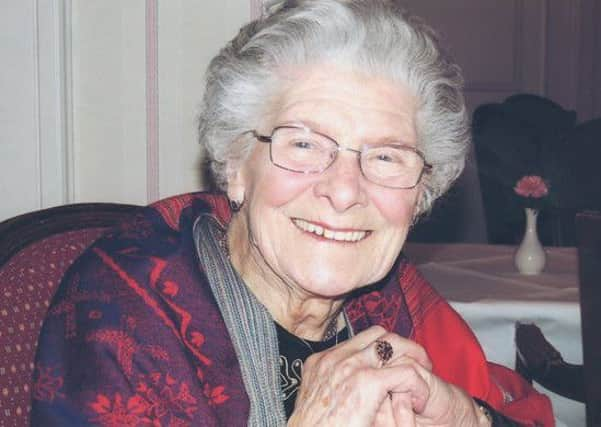Obituary: Elma Ross, widow of long-serving Secretary of State for Scotland Willie Ross, Lord Ross of Marnock


After leaving Ayr Academy, the young Elma enlisted for a secretarial course, eventually signing up for the Wrens in the early 1940s. She trained with the commando units at Lochailort before being stationed in India and Ceylon. It was while in Delhi that she met Major William Ross, both of them working under Lord Louis Mountbatten. The intensity of their courtship would have been compromised by being sent to Singapore at the end of the war where she was a shorthand writer at the Japanese war trials.
When the war ended so too did Churchill’s premiership. Clement Attlee’s landslide in 1945 for Labour slew Tory bastions. In Ayr, the ultra right wing Sir Thomas Moore was almost unseated by a 34 year old school teacher, Major Willie Ross. The disappointment of 1945 became the triumph of 1946 when Ross succeeded the early socialist feminist, Claris McNabb Shaw as MP for Kilmarnock. Two years after by election success in Kilmarnock, the couple married and Elma set about assisting the new MP, her administrative skills honed in the Far East, proving invaluable.
Advertisement
Hide AdAdvertisement
Hide AdFamily life took centre stage as well as politics, and Elma gave birth to her first daughter Fiona in 1948 and then Sheila in 1953. She bore the life of the wife of a public servant with great grace always being at Bill’s side ( as his family called him). With a deep, sonorous voice which came from the very soil of Burns country, Willie Ross was seen by Harold Wilson as the embodiment of working class Scotland. When Labour won in 1964 and then a landslide in 1966, Wilson deferred to Ross on all matters Scotland, and forged a partnership in spending and policy whose legacy is still felt today.
Elma Ross, who has died at the age of 94, led an extraordinary life which experienced some of the most tumultuous events in this country’s history and which marked a near century of fundamental change in the norms and mores of British society.
As a young woman she enlisted with the Wrens as part of her contribution to the war effort against global fascism. At 25 she married a demobbed army major who would become the longest serving Secretary of State for Scotland. At his side she would have a ringside seat as Britain changed from a country of deference marked by class distinctions, to a more open and liberal place. And as she entered the twilight of her life she observed a post liberal Britain as far removed from the Ayrshire of her early years as can be imagined. During all of these periods she carried herself with an almost timeless quality with little evidence that she was trapped by the norms of any decade in which she lived.
Willie Ross was a part revered, part feared figure in much of Scottish society. Elma was the perfect foil for those intimidated by the presence of her husband. In casual conversation she was empathetic, invariably fixed you with a direct eye but not in a threatening way. She missed little of import even if her dainty appearance and meticulously groomed frame suggested she was not taking mental notes. Her observations on the personalities of the day would have been a great service to the Scottish secretary.
In Harold Wilson’s Britain of white heat technology, the old class order finally shattered. In Scotland the swinging 60s perhaps moved to a less cosmopolitan beat but change came for all that. Willie Ross’s preoccupations were on delivering economically for Labour supporters and from fending off the evils of unemployment.
Labour unexpectedly lost in 1970 and unexpectedly won in 1974. When Wilson took the exit lounge from frontline politics with a shock resignation in March of 1976, one of his most loyal colleagues, Willie Ross, followed him.
Out of Cabinet, Bill and Elma had more time to spend together and could take a quiet satisfaction in the career development of their girls. Fiona would become a long standing broadcast journalist covering politics and Sheila a secondary school teacher, the gold standard career for a socialist household.
Elma’s beloved Bill died in 1988 but not before one last parliamentary hurrah. From the ermine benches Lord Ross of Marnock eviscerated the case for a poll tax as Mrs Thatcher stubbornly insisted on writing her own obituary.
Advertisement
Hide AdAdvertisement
Hide AdShe did not have the long retirement with Bill that she would have wanted but she managed to pack a calendar full of social and church activity in Ayr that kept her occupied. She continued to impress with an extraordinary power of recall. Once at a birthday dinner for Fiona, I mentioned in passing Gilbert McAlister (Labour MP for Rutherglen 1945-51). ‘Oh yes’ recalled Elma. ‘Gilbert was very much into the concept of world government’. You got the impression that she had forgotten more about politics than the average journalist will ever know.
Her latter years were blessed and none more so than with the arrival of her only grandchild, Ross Taylor born in 1994. A close, stable and loving family were important to her and she was never more radiant than with her girls over a family lunch.
Elma Ross had fastidious manners, great grooming and an understated yet certain sense of who she was and what she believed. She was never stuffy, never a prisoner of any age. With a dignified smile and a mischievous glint in her eye, she gave the impression of a person more than content with her lot. She was a fine woman and a great lady.
Bernard Ponsonby